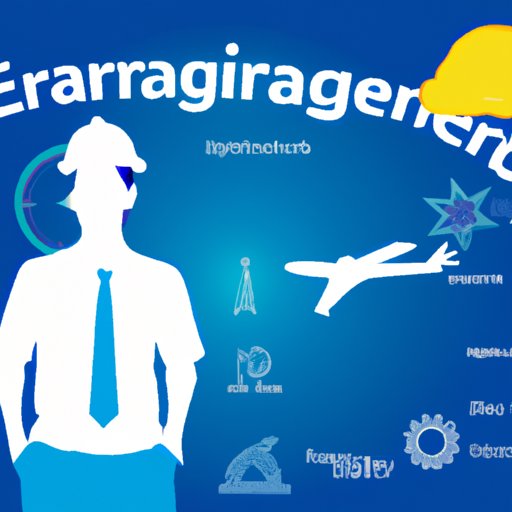
Analyzing the Salary of Aerospace Engineers
Aerospace engineers design and create aircraft, spacecraft, satellites and missiles. They also develop prototypes and test them using computer simulations and wind tunnels. To become one, you must have a strong knowledge of aerodynamics, propulsion systems and structural analysis. If you’re interested in this field, you may be wondering how much does an aerospace engineer make?
Definition of Aerospace Engineer
An aerospace engineer is a professional who uses their knowledge of engineering and physics to design or construct aircraft, spacecraft, missiles and other related products. They are responsible for researching, testing, constructing, analyzing and troubleshooting aerospace-related projects. In some cases, they may work with government agencies such as the Federal Aviation Administration (FAA) and the National Aeronautics and Space Administration (NASA).
Average Salaries for Aerospace Engineers
The average salary for aerospace engineers is $107,830 per year, according to the Bureau of Labor Statistics (BLS). This figure includes all levels of experience, from entry-level to mid-career and senior-level engineers. The median salary for aerospace engineers is $112,000, meaning half of the engineers surveyed earned more and half earned less.
Factors Affecting Pay
A variety of factors can affect an aerospace engineer’s salary, including experience, certifications and licensure, industry, geographic location, and educational background. All of these can influence how much you can earn as an aerospace engineer.
What Does an Aerospace Engineer Earn?
Aerospace engineers typically earn an average salary of around $107,830 per year. However, depending on experience, certifications, and other factors, this figure can vary significantly. Let’s take a closer look at what factors can influence an aerospace engineer’s salary.
Average Salaries by Industry
Aerospace engineers employed in the aerospace product and parts manufacturing industry earn the highest salaries, at an average of $122,330 per year. Those working in the federal executive branch make $117,730, while those in the scientific research and development services industry earn $112,520. Aerospace engineers employed in the architectural, engineering, and related services industry earn an average of $104,390.
Median Pay Rates
The median salary for aerospace engineers is $112,000. This means that half of the engineers surveyed earned more than this amount and half earned less. Those who have more experience and higher educational qualifications tend to earn more. For example, those with a master’s degree can expect to earn more than those with just a bachelor’s degree.
Paying Your Dues as an Aerospace Engineer
Becoming an aerospace engineer requires a lot of hard work and dedication. You’ll need to complete an accredited engineering program and gain experience through internships or co-op programs. Additionally, you must pass the Fundamentals of Engineering (FE) exam before you can become a licensed professional engineer.
Education Requirements
To become an aerospace engineer, you must have a bachelor’s degree in an engineering discipline, such as aerospace engineering, mechanical engineering, electrical engineering, or civil engineering. You may be able to enter the field with an associate’s degree, but you’ll likely need to complete a bachelor’s degree to advance in the field.
Professional Experience
Experience is key when it comes to getting a job as an aerospace engineer. Most employers require at least two years of experience in the field, so it’s important to get as much practical experience as possible. Internships and co-op programs are a great way to gain experience and build your resume.

How to Maximize Your Pay as an Aerospace Engineer
There are several ways to maximize your pay as an aerospace engineer. Certifications and licensure, networking and connections, and additional education are all great ways to increase your earning potential.
Certifications and Licensure
Earning certifications and licensure can help you stand out from the competition and boost your salary. The Fundamentals of Engineering (FE) exam is required to become a licensed professional engineer. Additionally, many employers prefer candidates who have specialized certifications such as the Certified Aerospace Engineer (CAE) designation.
Networking and Connections
Developing relationships with peers and professionals in the aerospace engineering field can open up new opportunities and help you land a better-paying job. Attend conferences, join professional associations, and network with colleagues to stay informed about the latest trends and developments in the field.

Breaking Down the Salaries of Aerospace Engineers
Let’s take a closer look at the salaries of aerospace engineers based on their level of experience:
Entry Level Salaries
Entry-level aerospace engineers typically earn around $67,000 per year. As they gain experience and move up in the ranks, they can expect to see their salaries increase.
Mid-Career Salaries
Mid-career aerospace engineers typically earn around $93,000 per year. This figure can vary depending on experience, certifications, and other factors.
Senior Level Salaries
Senior-level aerospace engineers typically earn around $124,000 per year. This figure can vary depending on experience, certifications, and other factors.
Conclusion
Aerospace engineers design and create aircraft, spacecraft, satellites and missiles and can earn an average salary of around $107,830 per year. The median salary for aerospace engineers is $112,000. Factors such as experience, certifications, and sector can all influence an aerospace engineer’s salary. Earning certifications and licensure, networking and connections, and additional education can all help to maximize your pay as an aerospace engineer.
(Note: Is this article not meeting your expectations? Do you have knowledge or insights to share? Unlock new opportunities and expand your reach by joining our authors team. Click Registration to join us and share your expertise with our readers.)
